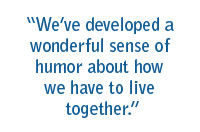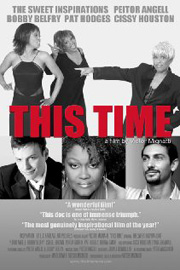 Filmmaker Victor Mignatti is the Grammy Award-nominated director of the 2008 Billboard #1 pop-culture phenomenon R. Kelly’s “Trapped in the Closet,” distributed by IFC. He is also the writer-director of the award-winning feature film “Broadway Damage,” director of “The Real World New Orleans,” and numerous television programs, reality specials, and pilots.
Filmmaker Victor Mignatti is the Grammy Award-nominated director of the 2008 Billboard #1 pop-culture phenomenon R. Kelly’s “Trapped in the Closet,” distributed by IFC. He is also the writer-director of the award-winning feature film “Broadway Damage,” director of “The Real World New Orleans,” and numerous television programs, reality specials, and pilots.
For Victor Mignatti, the West Village is where his heart has been for nearly three decades. After a recent nine-and-a-half-year stint in Los Angeles, the Philadelphia-born filmmaker is back in New York and currently resides on Greenwich Avenue. As Mignatti explains, “The West Village has been my spiritual home since I was 17. That’s when I came to NYU to study film between my junior and senior years in high school. Back then the West Village was far more dark and adventurous. Since that time, I’ve seen some wonderful changes and some upsetting changes in this neighborhood. I’m sad about the loss of local businesses and the shop fronts left vacant because of landlord greed. And I hope the newcomers—the new money—can embrace the heritage and diversity of the West Village. But it’s still a great neighborhood and I find that New York remains warm, engaging, and funny.”
In 1994 Mignatti moved to Los Angeles for work reasons, returning to New York on a permanent basis again in 2004. However, he never gave up his New York driver’s license or his West Village address. “I felt like a California license would be betraying New York,” Mignatti laughs. He does, though, have some nice things to say about the Los Angeles experience. “I love Los Angeles,” he admits. “It’s a great place in terms of quality of home life. Also, it’s easier to be an artist there financially than in New York right now. I lived in a beautiful house that I paid less for than my apartment here in the West Village.” However, it was the differences from New York that started to weigh on Mignatti. “What was hard for me about Los Angeles is that it’s very isolating and lonely because Angelenos are separated by their automobiles,” he says. “I’ve never found New York to be like that. Here everyone is sitting shoulder to shoulder on the subway. My last four years in Los Angeles I explored all kinds of neighborhoods because I really wanted to get my head around that town. But at the end of day I felt like I belonged in a pedestrian city with a sensibility more rooted in European traditions, so I moved back to New York.”
 Mignatti is currently in post-production—at Goldcrest Post on the corner of Horatio and Greenwich Streets—on his newest project. A feature music documentary entitled This Time, it follows the careers of six recording artists, including the legendary Sweet Inspirations who started as a stand-alone female group in the 60s and went on to be backup singers for performers like Aretha Franklin and Elvis Presley. As the artists attempt to make peace with the disappointments of their pasts they continue to pursue their dreams and what emerges is a funny, heartwarming, and beautifully edited tribute to the indomitable human spirit. “The project started because I was friends with Peitor Angell who produced music for TV commercials I’ve directed,” Mignatti recounts. “He told me he was producing the Sweet Inspirations’ first album in 23 years. I thought it sounded interesting and suggested I come over one day with my video camera and film it. Initially, I thought I could do a promotional piece for him. But after a couple of days, I realized it had the potential for being a wonderful feature documentary and I kept shooting.”
Mignatti is currently in post-production—at Goldcrest Post on the corner of Horatio and Greenwich Streets—on his newest project. A feature music documentary entitled This Time, it follows the careers of six recording artists, including the legendary Sweet Inspirations who started as a stand-alone female group in the 60s and went on to be backup singers for performers like Aretha Franklin and Elvis Presley. As the artists attempt to make peace with the disappointments of their pasts they continue to pursue their dreams and what emerges is a funny, heartwarming, and beautifully edited tribute to the indomitable human spirit. “The project started because I was friends with Peitor Angell who produced music for TV commercials I’ve directed,” Mignatti recounts. “He told me he was producing the Sweet Inspirations’ first album in 23 years. I thought it sounded interesting and suggested I come over one day with my video camera and film it. Initially, I thought I could do a promotional piece for him. But after a couple of days, I realized it had the potential for being a wonderful feature documentary and I kept shooting.”

This Time is starting to be screened at sneak previews and film festivals by Mignatti and his producer, West Villager Mark Bower. According to him the response has been phenomenal and they’re now looking for distribution as well as finishing funds. Alas, it’s a constant challenge to raise money and it’s only become more difficult with the current climate on Wall Street. In fact, Mignatti says that what separates the men from the boys in the world of filmmaking are those who can raise the money versus those who can’t. And if you can’t do it, you’re not going to be a filmmaker. “It’s very frustrating and painful at times,” he admits. “But the joy of sitting in a theatre and feeling an audience emotionally involved with your film, well, there’s nothing like it. It makes all the painful times sort of disappear. The rewards are tremendous if you can stick with it.”
Asked if he has any final thoughts on being an artist in the West Village, Mignatti responds, “I don’t feel New York is as inspiring as it used to be. Everything is too sanitized. But perhaps that’s because I’ve been here so long. I do think it’s very different than it was 30 years ago socio-economically. Today’s West Village artists are people who’ve achieved a certain level of financial success in their field. It’s not a place for struggling artists and I think that’s a major historical shift. It’s still a place for artists, but artists of a certain financial caliber. It’s interesting. Very interesting.”
Photo: Victor Mignatti
